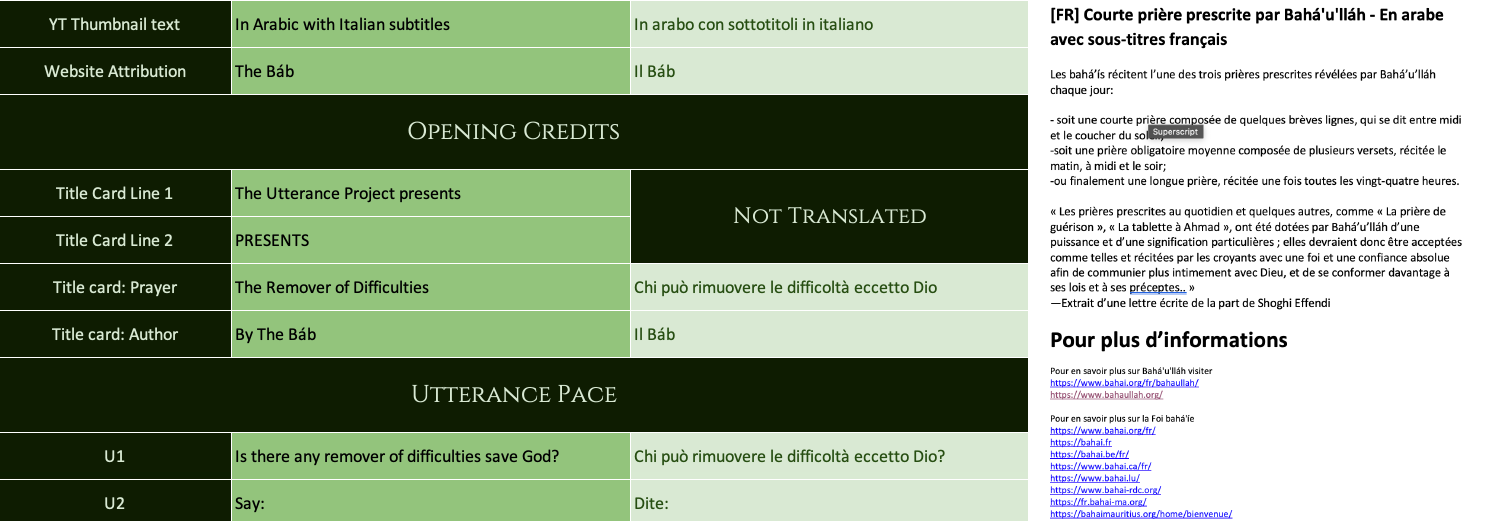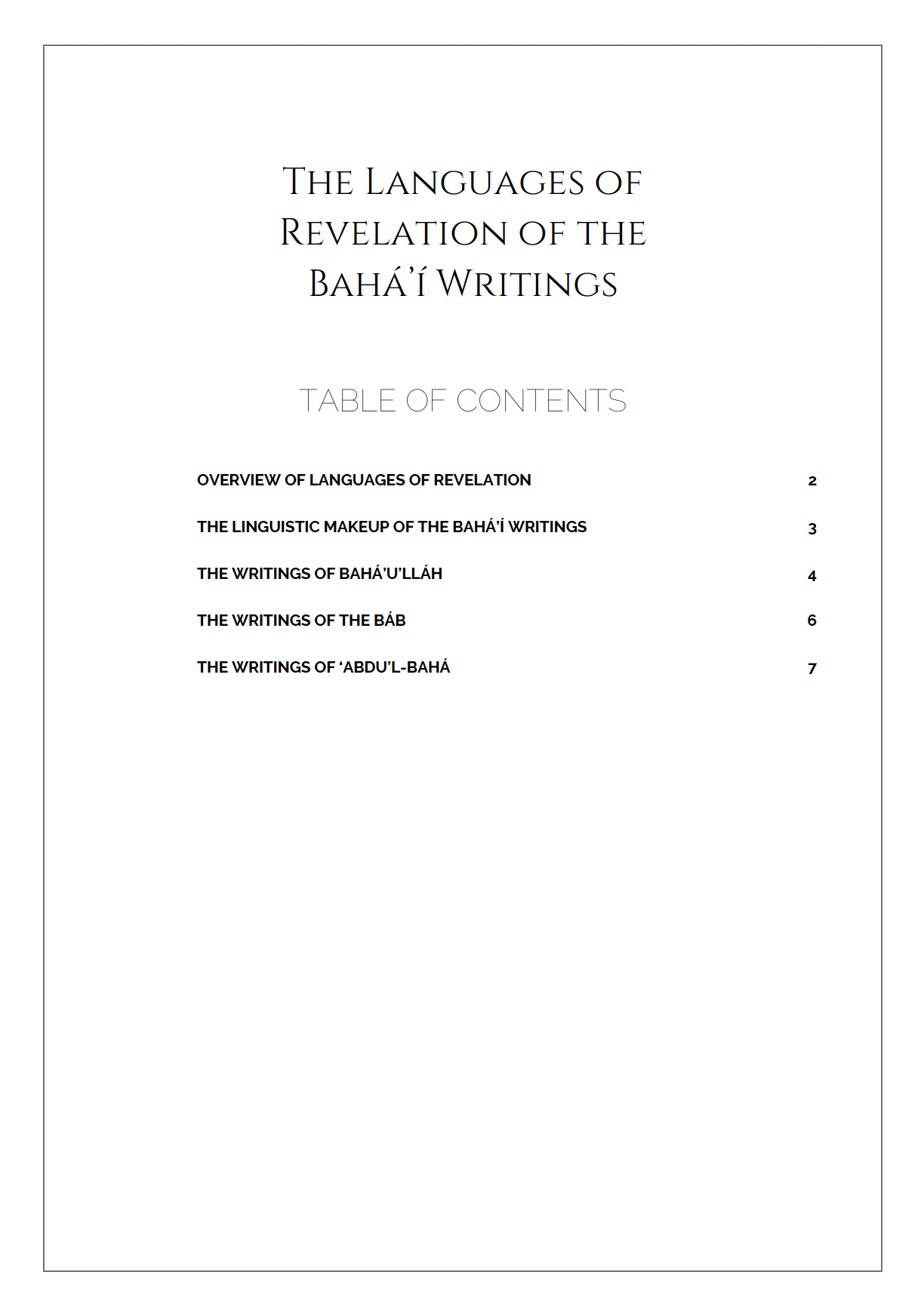
(Click on each question to reveal its answer)
Violetta and Adib had been following their own research paths into the Bahá'í Holy writings, Violetta in English and Adib in the original Arabic and Persian.
In late July 2020, Violetta was pursuing a very long compilation on the topic of selflessness, and was following up on something Mr. Ali Nakhjavaní had told her fifteen years prior: that in the Tablet of Visitation for 'Abdu'l-Bahá, the word « selflessness », or « fanáʼ » in the original Arabic, appeared three times in the verse « Give me to drink from the chalice of selflessness; with its robe clothe me, and in its ocean immerse me. »
A mutual friend put Violetta in touch with Adib and their exchanges on the original Arabic and Persian increased in detail, going into the structure of language, the poetry and eloquence of the original texts, and the rhyming of certain words and passages.
On 30 July 2020, Violetta's father, Kamal Zein, gave a talk in his regular "Storytelling Sunday" firesides, in which he told the story of meeting Hand of the Cause Tarazu'llah Samandari as a teenager in Tunis, Tunisia. When Hand of the Cause Samandari asked him if he spoke Arabic or Persian, and Kamal answered in the negative, Hand of the Cause Samandari replied in a booming voice:
« THE LANGUAGES OF BAHÁ'U'LLÁH! »
The very next day, Adib sent a voice note to Violetta with a particularly eloquent passage, enshrining all the qualities of the majesty of the original Arabic. He prefaced it simply by saying, "in so many cases, there is a musicality to it that can simply never be translated. One passage from the Lawh-i-Sultán comes to mind."
Khalil Gibran, the peerless Lebanese writer, poet and visual artist, even once told Juliet Thompson “There was no Arabic that even touched the Arabic of Bahá'u'lláh.”
Violetta approached Adib and they both found the idea of introducing the peoples of the world to the « languages of Bahá'u'lláh » by sharing English-subtitled recordings of excerpts from the Bahá'í Writings to be a worthy path of service—an idea that has now come to fruition as "The Utterance Project."
PS: You can hear Kamal Zein tell the story with Hand of the Cause Tarazu'llah Samandari in this YouTube video.
Adib lives in Austin, Texas (USA) (GMT-7) and Violetta lives in Pointe-Noire, Republic of Congo (Not the DRC) (GMT+1).
As a result of the eight-hour time difference, there are only a few short hours that overlap in which both of them are awake.
This effectively means that each of them does the bulk of their work while the other is asleep, and they have to be very organized to keep the production process going smoothly.
Two main tools make this work completely painless: Google Drive and Notion.so. Google Drive is where Adib and Violetta store most of the project documents, and Notion.so houses all their consultation pages, organized by project or subject.
The initial prayers we localize are very short, less than 100 words, as a rule.
As all the prayers are already translated, we are not literally "translating the prayers", we are making the video "local" to your language by translating the surrounding text, the opening and end credits, the YouTube description of the project and the YouTube description of the channel among others, so we are really "localizing" the video.
When you express a willingness to help us localize a short prayer (first the Short Obligatory Prayer, then the Remover of Difficulties, and if the views in your language keep increasing, O God Guide Me), we send you an introductory email with instructions and 3 documents:
- An Excel Spreadsheet with all the text you find in the video, on the YouTube thumbnail, in the opening credits, in the verses for the prayer, in the transition card between the two recitation paces, and in the end credits. The prayer is never translated, you simply copy the latest official published version approved by your National Spiritual Assembly; you may copy it from one of the only Bahá'í Prayer sites but it must match what is the latest approved published prayerbook;
- A short Word Document that contains the YouTube description of the prayer; and
- A second short Word document that contains the description of the YouTube channel in your language.
Below are screenshots of the two documents, in Word and Excel. If you don't have Word and Excel, we can work with Google Sheets and Google Docs:

Depending on how fast you work, this should only be a couple hours of work but one day at the very most.
When you're done, you simply send the documents back to us and we compile the video.
For non-latin languages like Japanese, Korean, Amharic, we do have to take a certain amount of time choosing the right font, and this can take up to a few days. You will tell us if all the characters display correctly or not in the font we have chosen, and if not, we will change the font.
Once the video is up for review, we will ask you to share it with one or two trusted native language speakers to ensure that there are no mistakes, and once everyone agrees the video is ready for publication, it goes live!
We are open to producing videos for any selection from the Báb, Baháʼuʼlláh, and ʻAbdu'l-Bahá—whether a Writing or a recorded oral utterance—so long as it has both an authenticated original text and an authorized translation into English. Examples of popular but ineligible Writings include:
-
From the Báb, "God is sufficient unto me. He, verily, is the all-sufficing..." (no authenticated original text available, only a well-known back-translation into Arabic)
-
From the Báb, "O God, my God, my Beloved, my heart's Desire" (no authenticated original text available, only a well-known back-translation into Arabic)
-
From Baháʼuʼlláh: "O my God! O my God! Unite the hearts of Thy servants..." (no authenticated original text available, only a well-known back-translation into Arabic)
-
From ʻAbdu'l-Bahá: "O God! Refresh and gladden my spirit..." (no authenticated original text available)
-
From ʻAbdu'l-Bahá, "O God! Educate these children..." (no authenticated original text available)
-
From ʻAbdu'l-Bahá, "The Midnight Prayer" (no authenticated original text available)
The purpose of our videos is less to teach the actual Persian and Arabic by correlating each word to the original text, and more to help our audience learn how to clearly recite the Writings in the original languages.
For us, this is a preliminary step designed to spark an interest in learning the original languages in the first place.
Adib here! I am the one who has been doing the recitations up to this point.
The closest thing to a standard or neutrally-accented Persian (what some might call "proper Persian") would be the Tehrani variety. I grew up in a Persian-speaking household of Iranians that speak Persian with this accent natively, so I would say that my Persian accent is very close to what you would get from someone who was born and raised in Iran.
My Arabic accent is a different story. I am not a native speaker of that language, but I did spend a summer in Jordan some years ago expressly to learn enough Classical Arabic (the kind used in the Qurʼán) so that I could engage with the Baháʼí Writings revealed in that language. In reality, there are so many kinds of Arabic that a speaker of Iraqi Arabic would not be able to easily understand a speaker of Moroccan Arabic, unless they both resorted to the macrolanguage of Modern Standard Arabic that is used by newscasters on TV.
I have read that Levantine Arabic might be the closest thing to a "neutral" Arabic accent, and that is the variety that is spoken in Jordan and some of the countries which surround it. So, I'd like to think that my Arabic accent is fairly neutral, but you'd have to ask some native Jordanians or Palestinians to be sure 😉
What I can tell you is that the vast majority of Iranian Baháʼís recite the Arabic Writings with a heavy Persian accent, and that my own Arabic accent is generally far from that as a result of my schooling and immersive experience in an Arab country, brief though they both were.
While we recognize that many Baháʼís are accustomed to hearing the Arabic Writings recited with a Persian accent (due to the large number of Iranians in Baháʼí communities all over the world), out of respect for the natural features of the Arabic language, our preference is not to pronounce it with a Persian accent.
Additionally, if we were to do this, we would have to release a separate video featuring a "Persianized" Arabic accent with all of our videos on the Arabic Writings if we wanted to be consistent, and this would unfortunately be quite time-consuming.
Adib records his recitations with a Blue Yeti Nano USB microphone and produces the audio files in Audacity.
He then sends these to Violetta, who adds them to the video project for the prayer in Adobe Premiere Pro (whichever is the latest version).
She builds the timing of the text graphics around the two paces of the recitation, then adds the opening, transition, and ending sequences and sends the exported project to Adib to start the review process.
Great question! We love elegant fonts here, so we love to talk about them, too.
- For the title card reading "The Utterance Project" (the same font is used for "Revealed by..." and "Recitation of the Prayer"): Cinzel Regular for roman alphabet languages. "The Utterance Project" is never translated;
- For the word below reading "PRESENTS": Lato Light in all Roman-alphabet languages, Songti TC for Chinese, and Omnes Cyrillic Semi Condensed for Russian;
- For the Arabic text: XB Zar
- For the Persian text: B Zar
- For the authorized translations: Didot for English and all Roman-alphabet languages, Charis SIL for Russian, and Heiti TC for Chinese
- For the transliterations: Lato Light
- For the last card reading "For more information, Visit (Site)": Copperplate Light
We are very lucky to have received permission to use the composition « Ya Bahá’u’l-Abhá », composed by Ameli Dziemba and performed as part of the European Bahá’í Choir Festival in 2019.
The full video can be found here.
*Over 90% of the works of the Báb, well over half of the works of Bahá’u’lláh, and one third of the works of ‘Abdu’l-Bahá are in Arabic; the remainder are in Persian or a mixture of the two."
Steven Phelps, “A Partial Inventory of the Works of the Central Figures of the Bahá’í Faith” (The latest version is always accessible online at Loom of Reality)
Both Bahá'u'lláh and 'Abdu'l-Bahá also revealed a small number of Tablets in Turkish but data is not available regarding the exact number of their Writings in Turkish.
The mixture of Arabic and Persian in the Bahá’í Writings is a truly novel and wonderful thing. It is not at all unusual for a text to begin in one language, switch to the other midway, and then switch back to the first language further on.
For further information on this—as well as three tables listing a breakdown of the major works of Bahá'u'lláh, The Báb, and 'Abdu'l-Bahá by language—please download our PDF below:
